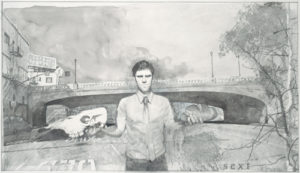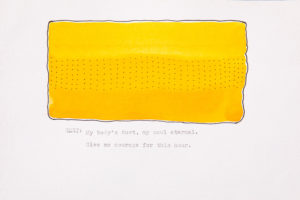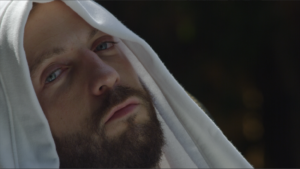The Hour of Sext: The sun is overhead. The traveler reaches a crossroad.
August 24, 2021
This is the fifth in a series of eight reflections on the Hours of prayer, focusing on Sext, the Hour in the middle of the day, when the sun is directly overhead. This series celebrates the release of the Praying the Hours soundtrack by Lolo Meares. An excerpt from the soundtrack starts the post so that you can have her sonic imagination of the tension of this Hour in your mind as you read. (A link to the album can be found at the bottom of this essay, along with a link to the book Praying the Hours in Ordinary Life from which the essay comes.)
Light and Dark Collide
Noon is the hour when the sun is overhead, sizzling and merciless yet glorious with the fullness of God. At this, the sixth hour, Adam and Eve ate together of the forbidden tree: consuming the knowledge of good and evil in the same bite of the same fruit. Their disobedience would result in expulsion from the Garden and a break in fellowship with God; yet in response God set in motion a plan of unimagined intimacy—to walk among them as a man, to send the Holy Spirit to live within them. Again, it was at the hour of Sext, when Christ hung on the cross to amend our sins, and a preternatural darkness fractured time. Day became night.
Sext is the dull center of ordinary time, the hazy clacking dry torpor of late summer, the midlife crisis of our days. We are tempted to laziness and despair, to apathy and the heat-worn lethargy that accompanies it. At this hour, everything seems hard. Hard to keep the precarious hold on what remains of the day, hard to climb, hard to hold on, hard to let go, hard to be bothered. Potential and possibility hold more mockery than promise. In her seminal work on acedia, Kathleen Norris describes the threat of this state of mind, which is far more nefarious than mere indifference: “Not only does [acedia] make us unable to care, it takes away our ability to feel bad about that.”
Who can bear to look at the sun directly, who can look directly at this Hour? What do you do with a day—a life—that feels as though it has not even started until noon? All the morning hours of light and encouragement are gone, perhaps wasted, and remaining are the afternoon hours of paradox and challenge. Half of life is spent, and night is coming.
No wonder the Benedictines called Sext “the Hour of the noonday devil.” Sext is also the Hour of the angel of intensity, however, when a surge of ambition and care wakes us from the poppy fields, when we are stirred by songwriter James Taylor’s advice to “look up from your life.” Because of this tension, all drama peaks in this Hour, and David Steindl-Rast says, “At this turning point we decide the fate of our day and cumulatively of our lives.” At no other hour do we so poignantly feel our dual nature, made in the eternal image of God and yet confined to temporal life. There is the wisdom and intention, the desire for legacy, and yearning for purpose greater than ourselves that comes with age. And yet there is the soul-crushing practicality and disappointment that comes of the same experience. The edges have been knocked off of Prime’s boundless enthusiasm and we are left at a crossroads where all choices are muddy.
However forlorn, impossible, or foolish our prospects are judged to be at this Hour, the prayers of Sext are to remind us that God prepares the way, and the door God has opened cannot be shut (Revelations 3:7). That way, in fact, is made perfect in the crucible of our thwarted plans. “Above all,” counsels Teilhard de Chardin, “trust in the slow work of God. We are quite naturally impatient in everything to reach the end without delay. We should like to skip the intermediate stages. . . . Yet it is the law of all progress that it is made by passing through some stages of instability and that may take a very long time.” At the crest of this Hour, God works—crowbar and blowtorch—to unseal the heavy doors that we have built around our hearts with all our troubled strategies. When God breaks through, we must receive with all our might and abandon ourselves to God’s rescue.
Du, gestern Knabe, dem die Wirrnis kam
Yesterday you were a boy,
today blind passion makes your blood swell.
You do not mean to seek lust but joy;
you have been chosen as a groom
whose desire is only for his bride.
But the spirit of lust pulls at you,
even ordinary arms suggest nakedness.
Even pale cheeks on pious paintings
blush with strange appeal.
Desire twists like a snake,
rising to the beat of the tambourine.
Suddenly you are left alone
with hands that will betray you
unless your will delivers a miracle.
But news from God comes
rushing through dark alleys
into your heart.
—Rainer Maria Rilke, The Book of Hours, I, 38
translated by Martina Nagel

Denise Louise Klitsie’s portrait of Sext depicts the struggle at midday between the angel of intensity and the noonday devil. (illustration from the book Praying the Hours in Ordinary Life)
Excerpt on Sext from Praying the Hours in Ordinary Life by Lauralee Farrer and Clayton J. Schmit, Wipf and Stock, 2010, used with permission and found here. Excerpt from the album on Sext, from the Praying the Hours soundtrack by Lolo Meares—with artwork by Lori Fox—can be freely streamed or purchased here. If you want to see the film or receive updates, write to info@burningheartproductions.com. To contribute to its release, go here.



